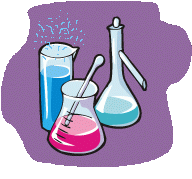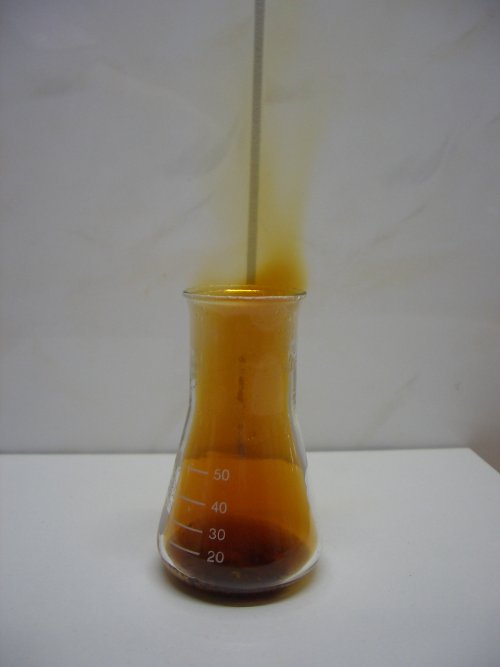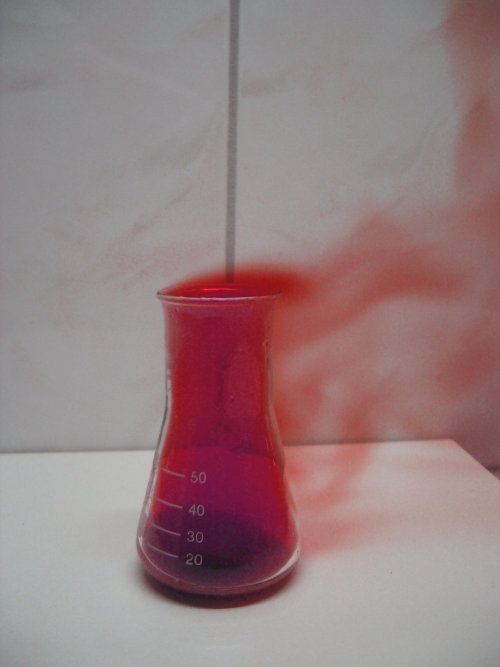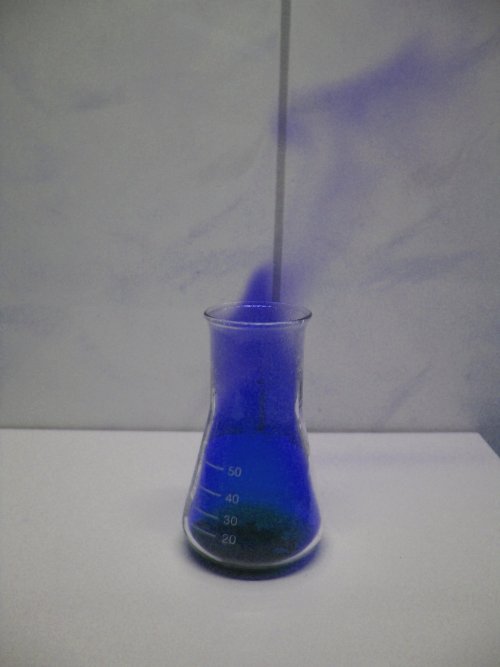


Colorful gases with Fe, HNO3 and GiMp2.2.6
This is a really remarkable experiment. It allows one to create gases of any color, ranging from deep red through all kinds of brown, all the way up to deep blue. It is a risky experiment however. During this experiment, a violent reaction occurs, in which a lot of poisonous gas is produced.
![]()
![]() Required
chemicals:
Required
chemicals:
-
nitric acid, concentration approximately 50% by weight
- iron powder or fine iron filings
- Gimp
![]() Required
equipment:
Required
equipment:
-
bottle or erlenmeyer, 50 ml or 100 ml
![]() Safety:
Safety:
- Concentrated nitric acid is very corrosive. It gives yellow stains on the skin and on longer exposure the skin is destroyed. Be careful!
- In the experiment, nitrogen dioxide is formed. This is an insidiously toxic gas. Exposure to this gas may not lead to immediate adverse effects, but it may have delayed effects. This experiment must be performed in a well-ventilated area or outside.
- Excessive exposure to Gimp may lead to problems with the muscles. For left-handed people the left arm and shoulder are most vulnerable, for right-handed people the right arm and shoulder are most vulnerable.
![]() Disposal:
Disposal:
- All waste can be strongly diluted with water and then it can be flushed down the drain with lots of water.
![]()
Procedure for making colored gases
![]() Put approximately 5 ml of concentrated nitric acid in an
erlenmeyer and add a spatula full of iron powder or fine iron filings to this.
This results in formation of a lot of brown nitrogen dioxide. The iron dissolves
and a dark brown liquid is formed as well.
Put approximately 5 ml of concentrated nitric acid in an
erlenmeyer and add a spatula full of iron powder or fine iron filings to this.
This results in formation of a lot of brown nitrogen dioxide. The iron dissolves
and a dark brown liquid is formed as well.
![]() Next, add some gimp at an approximate hue level of -30. This
results in formation of red gimped nitrogen dioxide. This procedure takes
approximately 2 minutes, but some experience is required. If in the meantime the
iron is dissolved, then it may be necessary to add some more iron. Addition of 1
or 2 ml of nitric acid may also add to the effect.
Next, add some gimp at an approximate hue level of -30. This
results in formation of red gimped nitrogen dioxide. This procedure takes
approximately 2 minutes, but some experience is required. If in the meantime the
iron is dissolved, then it may be necessary to add some more iron. Addition of 1
or 2 ml of nitric acid may also add to the effect.
![]() Finally add some more gimp at an approximate hue level of
-160. This results in formation of stunning blue/indigo gas. Again this
procedure requires some experience, but the result is really stunning.
Finally add some more gimp at an approximate hue level of
-160. This results in formation of stunning blue/indigo gas. Again this
procedure requires some experience, but the result is really stunning.
The pictures below show the three gasses formed from the nitric acid, iron powder and gimp. At the left the nitrogen dioxide is shown. The middle picture shows the gimped nitrogen dioxide at a hue level, equal to -30 and the right picture shows the double gimped nitrogen dioxide.



Beware, gimp can sometimes be unexpectedly unstable, resulting in total loss of all experimental results and leaving you with just brown nitrogen dioxide and some ferric nitrate.
![]()
Discussion of results
When iron is added to nitric acid, then it dissolves vigorously. Although literature states that iron is passivated by concentrated nitric acid, this experiment shows otherwise.
The iron dissolves quickly with formation of a lot of nitrogen dioxide:
Fe + 6HNO3 → Fe3+ + 3NO2 + 3NO3– + 3H2O
On addition of gimp, the spectral properties of the NO2 are shifted radically. The color of the nitrogen dioxide can be regarded as a point in the 3-dimensional RGB color space. By adding gimp to the reaction mixture, all points in the RGB color space are transformed by means of a shift operation in a 1-dimensional sub-space of a toroidal color space, derived from the RGB-color space. Adding sufficient gimp to the reaction mixture may even result in complete restoring of the color of the nitrogen dioxide.
The equation for producing gimped nitrogen dioxide is only approximate. There is not a specific stoichiometry. The precise method of adding gimp and the time it is acting on the nitrogen dioxide determines the color of the final product.
NO2 + nGiMp2 → NO2·nGiMp2